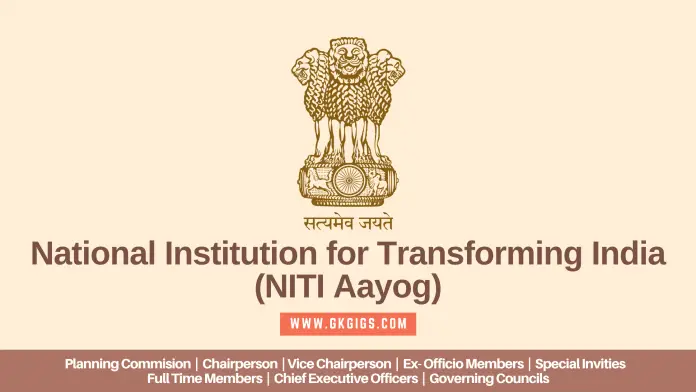
Last Updated: 25 March 2023
The NITI Aayog or National Institution for Transforming India serves as the apex public policy Think Tank of the Government of India and the nodal agency tasked with catalyzing Economic Development and Fostering Cooperative Federalism through the involvement of State Governments of India in the economic policy-making process using a bottom-up approach.
NITI Aayog was established in 2015, by the NDA Government, to replace the Planning Commission which followed a top-down model. The NITI Aayog council comprises all the state Chief Ministers, along with the Chief Ministers of Delhi & Puducherry, Lieutenant Governors of all UTs, and a Vice-chairman nominated by the Prime Minister.
In addition, Temporary Members are selected from leading Universities & Research Institutions. These members include a Chief Executive Officer, Four Ex-Official Members, and two Part-Time Members.
Page Contents
NITI Aayog At A Glance
| No. | Header | Information |
|---|---|---|
| 1 | NITI | National Institution for Transforming India |
| 2 | Formed | 1st January 2015 |
| 3 | Preceding Government Agency | Planning Commission |
| 4 | Jurisdiction | Government of India |
| 5 | Headquarters | New Delhi |
| 6 | Annual Budget | ₹339.65 crores ($48+ million) (2020–21) |
| 7 | Government Agency | Narendra Modi (Chairperson) |
| 8 | Executives | Vice Chairperson: Suman Bery CEO: B.V.R. Subrahmanyam |
| 9 | Parent Government Agency | Ministry of Planning |
| 10 | Website | www.niti.gov.in |
Introduction On Planning Commission
After India achieved independence a formal model of planning was adopted and accordingly the Planning Commission, reporting directly to the Prime Minister of India, was established on 15th March 1950, with Prime Minister Jawaharlal Nehru as the Chairman.
Authority for the creation of the Planning Commission was not derived from the Constitution of India or statute; it is an arm of the Central Government of India. The Planning Commission was an institution in the Government of India, which formulated India’s Five-Year Plans, among other functions.
Prime Minister Narendra Modi in his first Independence Day speech in 2014 announced his intention to dissolve the Planning Commission. It has since been replaced by a new institution named NITI Aayog.
| No. | Header | Information |
|---|---|---|
| 1 | Formed | 15th March 1950 |
| 2 | Dissolved | 13th Aug 2014 |
| 3 | Superseding Agency | NITI Aayog |
| 4 | Headquarters | Yojana Bhavan, New Delhi |
| 5 | Agency Executive | Prime Minister of India |
| 6 | Parent Agency | Government of India |
| 7 | Website | planningcommission.gov.in |
Deputy Chairman Of The Planning Commission
| No. | Deputy Chairman | Term In | Term Out |
|---|---|---|---|
| 1 | Gulzarilal Nanda | 17 Feb 1953 | 21 Sep 1963 |
| 2 | V. T. Krishnamachari | 17 Feb 1953 | 21 Jun 1960 |
| 3 | Chandulal Madhavlal Trivedi | 22 Sep 1963 | 02 Dec 1963 |
| 4 | Dhananjay Ramchandra Gadgil | 02 Sep 1967 | 01 May 1971 |
| 8 | P. N. Haksar | 04 Jan 1975 | 31 May 1977 |
| 9 | D. T. Lakdawala | 01 Jun 1977 | 15 Feb 1980 |
| 10 | N. D. Tiwari | 09 Jun 1980 | 08 Aug 1981 |
| 11 | Shankarrao Chavan | 09 Aug 1981 | 19 Jul 1984 |
| 12 | Prakash Chandra Sethi | 20 Jul 1984 | 31 Oct 1984 |
| 13 | P. V. Narasimha Rao | 01 Nov 1984 | 14 Jan 1985 |
| 14 | Manmohan Singh | 15 Jan 1985 | 31 Aug 1987 |
| 15 | P. Shiv Shankar | 25 Jul 1987 | 29 Jun 1988 |
| 16 | Madhav Singh Solanki | 30 Jun 1988 | 16 Aug 1989 |
| 17 | Ramakrishna Hegde | 05 Dec 1989 | 06 Jul 1990 |
| 18 | Madhu Dandavate | 07 Jul 1990 | 10 Dec 1990 |
| 19 | Mohan Dharia | 11 Dec 1990 | 24 Jun 1991 |
| 20 | Pranab Mukherjee | 24 Jun 1991 | 15 May 1996 |
| Madhu Dandavate[18] | 01 Aug 1996 | 21 Mar 1998 | |
| 21 | Jaswant Singh | 25 Mar 1998 | 04 Feb 1999 |
| 22 | K. C. Pant | 05 Feb 1999 | 17 Jun 2004 |
| 23 | Montek Singh Ahluwalia | 06 Jul 2004 | 26 May 2014 |
Initiatives Of NITI Aayog
- 15-Year Road Map
- 7-Year Vision, Strategy, & Action Plan
- AMRUT
- Agriculture Reforms
- Atal Innovation Mission
- Digital India
- Education & Water Management
- Indices Measuring States’ Performance in Health
- Medical Education Reform
- Sub-Group of Chief Ministers on Rationalization of Centrally Sponsored Schemes
- Sub-Group of Chief Ministers on Skill Development
- Sub-Group of Chief Ministers on Swachh Bharat Abhiyan
- Task Forces on Agriculture and up of Poverty
- Transforming India Lecture Series.
History Of NITI Aayog
- On 29th May 2014, the Independent Evaluation Office submitted an assessment report to Prime Minister Narendra Modi with the recommendation to replace the Planning Commission with a “Control Commission”.
- On 13th August 2014, the Union Cabinet scrapped the Planning Commission (India), to be replaced with a diluted version of the National Advisory Council (NAC) of India which was established by the UPA government.
- On 1st January 2015, a Cabinet resolution was passed to replace the Planning Commission with the newly formed NITI Aayog (National Institution for Transforming India).
- The Union Government of India announced the formation of NITI Aayog on 1st January 2015.
- The first meeting of the NITI Aayog was chaired by Narendra Modi on 8th February 2015.
Members Of NITI Aayog
- A Governing Council composed of Chief Ministers of all the States & Union Territories with Legislatures and Lieutenant Governors of Union Territories (except Delhi & Puducherry).
- Regional Councils composed of Chief Ministers of States and Lt. Governors of Union Territories in the region to address specific issues and contingencies impacting more than one state or region.
- Full-time organizational framework composed:
- Vice-Chairperson
- Four Full-Time Members
- Two Part-Time Members (from leading Universities, Research Organizations, and other relevant Institutions in an Ex-officio capacity)
- Four Ex-Officio Members of the Union Council of Ministers
- Chief Executive Officer (with the rank of Secretary to the Government of India) who look after the administration.
- Secretariat.
- Experts and specialists in various fields.
- Rao Inderjit Singh, Union Minister of State (Independent Charge) of Ministry of Statistics and Programme Implementation; Union Minister of State (Independent Charge) of Ministry of Planning; & Union Minister of State of Ministry of Corporate Affairs.
Members At A Glance
| No. | Header | Information |
|---|---|---|
| 1 | Chairperson | Narendra Modi |
| 2 | Vice Chairperson | Suman Bery |
| 3 | Ex-Officio Members | 1) Amit Shah 2) Rajnath Singh 3) Nirmala Sitaraman 4) Narendra Singh Tomar |
| 4 | Special Invitees | 1) Nitin Gadkari 2) Piyush Goyal 3) Virendra Kumar 4) Ashwini Vaishnaw 5) Rao Inderjit Singh |
| 5 | Full-time Members | 1) Dr. V. K. Saraswat (Ex DRDO Chief) 2) Prof. Ramesh Chand (Agriculture Expert) 3) Dr. V. K. Paul (Public Health Expert) 4) Dr. Arvind Virmani ( Economist) |
| 6 | Chief Executive Officer (CEO) | B.V.R. Subrahmanyam |
| 7 | Governing Council | 1) All Chief Ministers of States (+ Delhi & Puducherry) 2) Lieutenant Governor of Andaman & Nicobar Islands 3) Special Invites |
Objectives Of NITI Aayog
- To evolve a shared vision of national development priorities, sectors, and strategies with the active involvement of States.
- To foster cooperative federalism through structured support initiatives and mechanisms with the States continuously, recognizing that strong States make a strong nation.
- To develop mechanisms to formulate credible plans at the village level and aggregate these progressively at higher levels of government.
- To ensure, in areas that are specifically referred to it, that the interests of national security are incorporated in economic strategy and policy.
- To pay special attention to the sections of our society that may be at risk of not benefiting adequately from economic progress.
- To design strategic and long-term policy and programme frameworks and initiatives, and monitor their progress and their efficacy. The lessons learned through monitoring and feedback will be used for making innovative improvements, including necessary mid-course corrections.
- To provide advice and encourage partnerships between key stakeholders and national and international like-minded think tanks, as well as educational and policy research institutions.
- To create a knowledge, innovation, and entrepreneurial support system through a collaborative community of national and international experts, practitioners, and other partners.
- To offer a platform for the resolution of inter-sectoral and inter departmental issues in order to accelerate the implementation of the development agenda.
- To maintain a state-of-the-art resource centre, be a repository of research on good governance and best practices in sustainable and equitable development as well as help their dissemination to stakeholders.
- To actively monitor and evaluate the implementation of programmes and initiatives, including the identification of the needed resources so as to strengthen the probability of success and scope of delivery.
- To focus on technology upgradation and capacity building for the implementation of programmes and initiatives.
- To undertake other activities as may be necessary in order to further the execution of the national development agenda, and the objectives mentioned above.
Features Of NITI Aayog
NITI Aayog is developing itself as a state-of-the-art resource centre with the necessary knowledge and skills that will enable it to act with speed, promote research and innovation, provide strategic policy vision for the government, and deal with contingent issues.
It is supported by an attached office, Development Monitoring and Evaluation Organisation (DMEO), a Flagship Initiative, Atal Innovation Mission (AIM), and an autonomous body, the National Institute of Labour Economics Research and Development (NILERD).
NITI Aayog’s entire gamut of activities can be divided into four main heads:
- Policy & Programme Framework
- Cooperative Federalism
- Monitoring & Evaluation
- Think Tank, Knowledge & Innovation Hub
The different Verticals, Cells, Attached, & Autonomous bodies of NITI provide the requisite coordination and support framework needed to carry out its mandate.
The list of Verticals and Cells is given below.
| No. | Verticals/Cells | No. | Verticals/Cells |
|---|---|---|---|
| 1 | Administration | 13 | Infrastructure-Energy |
| 2 | Agriculture and Allied Sectors | 14 | Natural Resources and Environment, and Island Development |
| 3 | Aspirational Districts Programme Cell | 15 | Project Appraisal and Management Division |
| 4 | Communication and Social Media Cell | 16 | Public-Private Partnership |
| 5 | Data Management and Analysis, Frontier Technologies | 17 | Rural Development |
| 6 | Economics and Finance Cell | 18 | Science and Technology |
| 7 | Education | 19 | Social Justice and Empowerment, and Voluntary Action Cell |
| 8 | Governance and Research | 20 | Social Sector-I (Skill Development, Labour and Employment, Urban Development) |
| 9 | Governing Council Secretariat and Coordination | 21 | Social Sector II (Health and Nutrition, Women and Child Development) |
| 10 | Industry-I | 22 | State Finances and Coordination |
| 11 | Industry-II | 23 | Sustainable Development Goals |
| 12 | Infrastructure-Connectivity | 24 | Water Resources/Pradhan Mantri Krishi Sinchayee Yojana/Land Resources |
Meeting Of Governing Council
NITI Aayog was formed via a resolution of the Union Cabinet on 1st January 2015. The Governing Council of NITI Aayog, comprising Chief Ministers of all the States & Union Territories with legislatures and Lieutenant Governors of other Union Territories, came into effect on 16th February 2015 via notification by the Cabinet Secretariat.
The Governing Council was reconstituted vide a notification dated 19th February 2021 by the Cabinet Secretariat. The Governing Council is the premier body tasked with evolving a shared vision of national priorities and strategies, with the active involvement of States, in shaping the development narrative.
The Governing Council, which embodies the objectives of cooperative federalism, presents a platform to discuss inter-sectoral, inter-departmental, and federal issues to accelerate the implementation of the national development agenda.
So far, seven meetings of the Governing Council have been held under the chairmanship of the Hon’ble Prime Minister with Chief Ministers/Lt Governors of the States/UTs and other members of the Governing Council.
| No. | Meeting | Date |
|---|---|---|
| 1 | First Meeting | 08 Feb 2015 |
| 2 | Second meeting | 15 Jul 2015 |
| 3 | Third Meeting | 23 Apr 2017 |
| 4 | Fourth Meeting | 17 Jun 2018 |
| 5 | Fifth Meeting | 15 Jun 2019 |
| 6 | Sixth Meeting | 20 Feb 2021 |
| 7 | Seventh Meeting | 07 Aug 2022 |
Full Forms Related To NITI Aayog
| No. | Acronym | Full-Forms |
|---|---|---|
| 1 | AIM | Atal Innovation Mission |
| 2 | APMC | Agriculture Produce Marketing Committee |
| 3 | ATL | Atal Tinkering Lab |
| 4 | CAMPA | Compensatory Afforestation Fund Management and Planning Authority |
| 5 | DoPT | Department of Personnel and Training |
| 6 | DoSE&L | Department of School Education & Literacy |
| 7 | ECA | Essential Commodities Act |
| 8 | GC | Governing Council |
| 9 | GDP | Gross Domestic Product |
| 10 | GeM | Government e Marketplace |
| 11 | GrAM | Gramin Agricultural Markets |
| 12 | IFC | Institute For Competitiveness |
| 13 | III | India Innovation Index |
| 14 | MNREGA | Mahatma Gandhi National Rural Employment Guarantee Act |
| 15 | MoHUA | Ministry of Housing and Urban Affairs |
| 16 | NAC | National Advisory Council |
| 17 | NAM | National Agriculture Market |
| 18 | NDA | National Democratic Alliance |
| 19 | NEP | National Education Policy |
| 20 | POSHAN | Prime Minister’s Overarching Scheme for Holistic Nutrition |
| 21 | SEP | Student Entrepreneurship Programme |
| 22 | UPA | United Progressive Alliance |
| Read More |
- 100+ Indian Constitution GK Questions And Answers
- Union Cabinet Ministers Of India With PDF (2023 Update)
- 250+ Measuring Devices And Instruments (2023 Updated)
- 100+ Electric Car Companies With Car Models (2023 Updated)
- Facts About Central Vista Redevelopment Project (2020-2024)












